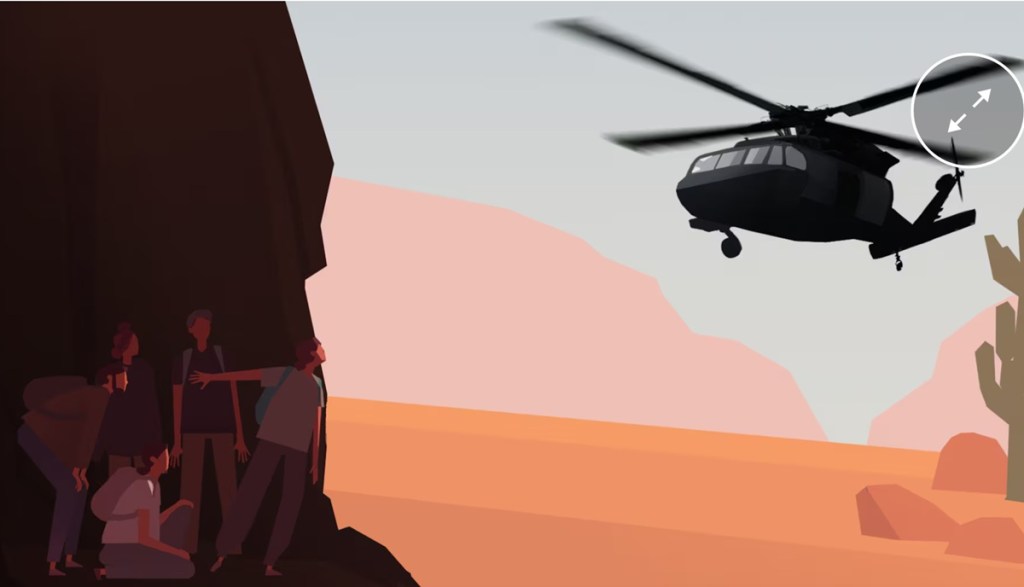Anima Interactive revealed its code-named Take Us North game about migrant journeys. It hopes the game will answer the question of what it would be like to walk in someone else’s shoes.
It’s a very different kind of survival narrative game that puts you in the shoes of migrants, refugees, asylum seekers and other travelers seeking a better life across the U.S.-Mexico border. The game was revealed today on the Latin American Games Showcase ahead of The Game Awards this week.
It’s based on a lot of academic research and is coming at a time when political opinions about border policy are scorching not just the U.S. political landscape but the whole world. And it’s the product of a studio founded by Karla Reyes, a daughter of immigrant parents from Guatemala.
In an interview with GamesBeat, Reyes said that the project is a narrative adventure/survival game that follows the journeys of migrants, refugees, and asylum seekers on their way to cross the US-Mexico border.
“We’re mindful this is a heavy-hitting topic, but it’s one we aim to portray sensitively, authentically, and respectfully. It’s a subject matter that’s deeply personal to our predominantly Latinx development team, and we are collaborating with migrants with lived experience, anthropologists, and experts in migration,” Reyes said.

The point of making Take Us North goes beyond making a game. It’s about conveying the reality of crossing the border and why people do it. The goal is to contribute to a broader cultural conversation and foster greater awareness and empathy around critical issues that are unfortunately too often reduced in mainstream media to statistics or divisive rhetoric, Reyes said.
Anima Interactive, which last year staged a game jam for justice with funding from Cinereach, has early-stage funding support from Xbox, Cinereach, and Clever Endeavour Games. It will be launching a Kickstarter campaign soon alongside an announcement during the Latin American Games Showcase as part of The Game Awards.
The story of the game will take players on the same journey experienced by migrants as they cross the Sonoran Desert, risking their lives in search of something better. The goal is to convey that part of the narrative that people, including politicians, tend to ignore. The journey starts in Nogales, Mexico, and moves through to the north. It is a combination of 2D cutscenes that are more like memories and playable 3D scenes.

The game is a single-player narrative with a heavy-hitting but thoughtful game, Reyes said. Migrants may face big choices like deciding whether to take an evasive but complicated route in order to avoid immigration police but running the risk of dehydration and starvation.
“We’re trying to tackle it very sensitively and authentically. It feels even more critical now election results are in,” Reyes said.
She added, “We’re not taking a combative approach. We just want to expose more of the human elements of the experience, mostly around the tragedy of what actually happens.”
It’s reminiscent in that way of Bury Me, My Love, about Syrian refugees, Reyes said. The emphasis will be on facts and realities, as opposed to political arguments, Reyes said. There will also be lore and cultural knowledge, such as belief in magical realism.
Consulting with experts and hoping for political change
The team is consulting with anthropologists from the University of California at Los Angeles (including Wanda Quintanilla Duran, who has a doctorate in anthropology from UCLA and was a collaborator on the Undocumented Migration Project) and it is also pulling from the personal experiences of the families of team members. It will depict things like riding on top of a speeding train across Mexico, as many migrants have experienced.
The team spent almost a full year in pre-production on the Unity game engine and it is having early conversations with funders, publishers and more so it can get the game in the hands of players. The team was also inspired by Carne y Arena, a film created by Mexican director Alejandro González Iñárritu. He worked with a nonprofit dubbed the Domestic Workers Alliance, which helped make a change in U.S. policy on domestic workers’ rights.
“That was just a really powerful study for us,” Reyes said.
In one interview with El Pais, Reyes pointed out an article from the Robert Schuman Centre of the European University Institute (EUI) showed that while voters’ perceptions of migration are very ingrained and hard to change, it’s easier to change the minds of young people when it comes to shaping new perceptions, understandings and narratives.
Reyes noted there is a preconception that migrants are mostly from Mexico, but she noted there are migrants from all over the world that come through Mexico to the U.S.
While the topic is educational, the game will have a serious entertainment focus, with the goal of using the compelling engagement of games to convey a message to an audience that might not get the message any other way, Reyes said.
The team has almost 20 people that includes full-time and part-time people as well as advisers. That’s why more funding will be needed.
The Kickstarter campaign is pre-launching for publicity this week and it will actually kick off January. The aim will likely be to raise around $50,000, with the goal raising awareness about the project.
So far, Reyes has had a lot of good feedback.
“We’ve gotten a lot of positive reception already from the audience,” she said. Her hope is that the large population in the middle — perhaps apathetic or ignorant of the realities — could be swayed to think more critically about the issue of illegal immigration and solutions to the problem.
Source link

